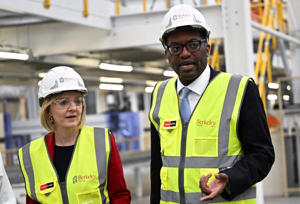
© AFP via Getty Images BRITAIN-BUDGET-ECONOMY-INFLATION
Liz Truss and Kwasi Kwarteng have been accused of recklessly gambling with the UK’s finances, as the poundslumped to an all-time low on the back of a borrwoing-fuelled tax cut spree.
Labour’s shadow chancellor Rachel Reeves accused the PM and the chancellor “behaving like two gamblers in a casino chasing a losing run”, after Mr Kwarteng hinted at tax cuts beyond the £45bn package in his mini-Budget.
One of the chancellor’s allies told The Times the sharp drop in the pound’s worth was “City boys playing fast and loose with the economy”.
Ms Reeves told Times Radio: “Instead of blaming everybody else, the chancellor and the prime minister, instead of behaving like two gamblers in a casino chasing a losing run, they should be mindful of the reaction not just on the financial markets but also of the public.”
UP NEXT
She added: “Financial markets are unimpressed, the British public are unimpressed … Because they’re not gambling with their own money – they’re gambling with all our money, and it’s reckless and it’s irresponsible as well as being grossly unfair.”
The shadow chancellor – who will set out Labour’s economic plan at the party conference on Monday – said she is “incredibly worried” about the sell-off in the pound, warning it would put pressure on the Bank of England to further raised interest rates.
Sterling tumbled to $1.035 on Monday in early Asia trading before it regained some ground to about $1.05, still a 20-year low.
Chloe Smith, the work and pensions secretary, told Sky News: “I wouldn’t be able to comment on market movements … lots of factors go into market movements.”
Mr Kwarteng dismissed questions about markets panicking on Sunday, after he revealed he was using more than £70bn of increased borrowing to pay for the biggest programme of tax cuts for 50 years.
On Sunday, the chancellor denied the widespread accusations they favour the rich, claiming that the cuts “favour people right across the income scale” – and saying “there’s more to come”.
Mr Kwarteng and Ms Truss are reportedly ready to go further in their tax-cutting, borrowing spree in the New Year, with possible further reductions in income tax.
The government is reportedly considering abolishing a charge for parents who earn more than £50,000 and claim child benefit, increasing the annual allowances on pension pots – and offering a tax break for people who stay at home to care for children or loved ones.
Ms Reeves said: “The chancellor instead of doubling down on his position on Friday needs to now set out credible plans.”
The chancellor’s £45bn tax-slashing package was met with alarm by top economists, markets and some Tory MPs, fuelling predictions sterling could plunge to parity with the US dollar by the end of the year.
Such a slump could trigger a rebellion from Tory backbenchers, who could refuse to vote for the government’s finance bill or submit letters of no confidence, The Telegraph reported, citing backers and critics of the PM.
In a sign of Tory unease, Conservative former chancellor George Osborne urged the government to end the “schizophrenic” policy of slashing taxes and increasing borrowing.
Ms Osborne told Channel 4 News: “Fundamentally, the schizophrenia has to be resolved – you can’t have small-state taxes and big-state spending.”
Former deputy prime minister Damian Green told GB News “there’s more to conservatism than tax cutting”, and said with a general election in two years things “have to happen quickly”.
Labour leader Sir Keir Starmer, who pledged that a Labour government would reinstate the top income tax rate of 45 per cent, hit out at the government’s “wrongheaded” economic policies.
Mr Reeves will use her speech at the party’s conference in Liverpool on Monday to set out the party’s own plan for growth, which would begin with an initial £8.3bn investment to fund green industries.
The creation of the national wealth fund could be modelled on similar institutions in countries like Norway and Singapore, and its aim is to create long-term wealth for Britain.
From news to politics, travel to sport, culture to climate – The Independent has a host of free newsletters to suit your interests. To find the stories you want to read, and more, in your inbox, click here.